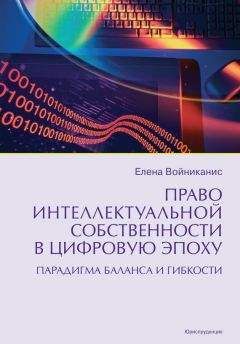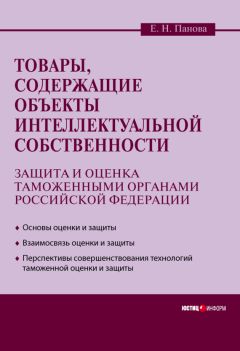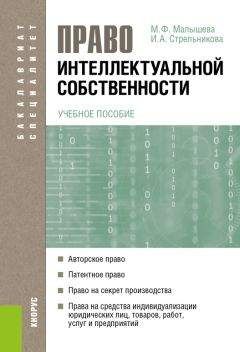Ознакомительная версия.
20. Burke J. Connections. Macmillan London Limited, 1987.
21. Burrell R., Coleman A. Copyright Exceptions: The Digital Impact. Cambridge University Press, 2005.
22. Cai M. Madey v. Duke University: Shattering the Myth of Universities’ Experimental Use Defense // Berkeley Technology Law Journal. 2004. Vol. 19. Issue 1. P. 175–192.
23. Calabresi G. Some Thoughts on Risk Distributions and the Law of Torts // The Yale Law Journal. 1961. Vol. 70. P. 499–553.
24. Canaris C.-W. Systemdenken und Systembegriff in der Jurisprudenz. Berlin: Duncker und Humblot, 1983.
25. Castells M. The rise of the network society. With a New Preface. Vol. I: The Information Age: Economy, Society, and Culture. Publisher: Wiley-Blackwell, 2010.
26. Coase R. The Problem of Social Costs // Journal of Law & Economics. 1960. Vol. 3. P. 1–44.
27. Concise international and European IP law: TRIPS, Paris Convention, European enforcement and transfer of technology. Ed. Cottier T., Veron P. Kluwer Law International, 2008.
28. Copyright Enforcement and the Internet. Edited by Irini A. Stamatoudi. Kluwer Law International, 2010.
29. David R. The Methods of Unification // American Journal of Comparative Law. 1968. № 16. P. 13–27.
30. Denneson T.J. The Definitional Imbalance Between Copyright and the First Amendment // William Mitchell Law Review. 2004. Vol. 30. P. 895–929.
31. Dewey J. Logical Method and Law // The Essential Dewey: Pragmatism, education, democracy. Vol. 1. Ed. by John Dewey, Larry Hickman, Thomas M. Alexander. Indiana University Press, 1998. P. 355–362.
32. Economics, Law and Intellectual Property: Seeking Strategies for Research and Teaching in a Developing Field. Granstrand, Ove (Ed.). Kluwer Academic, 2003.
33. Ekstrand V.S. News Piracy and the Hot News Doctrine: Origins in Law and Implications for the Digital Age. New York: LFB Scholarly Publishing, 2005.
34. Ewing J. Copyright and authors // First Monday. 2003. Vol. 8. № 10.
35. Fichte J.G. Beweis der Unrechtmäßigkeit des Büchernachdrucks. Ein Räsonnement und eine Parabel // Johann Gottlieb Fichte’s Sämmtliche werke, Vol. 8. Veit und Comp., 1846.
36. Final Report on Digital Preservation, Orphan Works, and Out-of-Print Works // i2010: Digital Libraries High Level Expert Group – Copyright Subgroup, 2008.
37. Freeman R.B. Does Globalization of the Scientific/Engineering Workforce Threaten U.S. Economic Leadership? // Innovation Policy and the Economy. The MIT Press, 2006. P. 123–157.
38. Fuller L. The Morality of Law. New haven, 1964.
39. Galler B. A. Software and Intellectual Property Protection: Copyright and Patent Issues for Computer and Legal Professionals. Westport, Quorum Books, 1995.
40. Goldman D.B. Globalisation and the Western Legal Tradition: Recurring Patterns of Law and Authority. Cambridge University Press, 2008.
41. Goldstein P. International copyright: principles, law, and practice. Oxford University Press, NY, 2001.
42. Goldstein P. International copyright: principles, law, and practice. Oxford, 2001.
43. Grechenig K.R. and Gelter M. The Transatlantic Divergence in Legal Thought: American Law and Economics vs. German Doctrinalism // Hastings International and Comparative Law Review. 2008. Vol. 31. № 1. P. 295–360.
44. Helpman, E. Innovation, imitation, and intellectual property rights // Econometrica. 1993. Vol. 61 (6). P. 1247–1280.
45. Holzapfel H., Sarnoff J.D. A cross-Atlantic dialog on experimental use and research tools //IDEA – The Intellectual Property Law Review. 2008. Vol. 48. № 2. P. 123–224.
46. Hugenholtz P.B. Code as code, or the end of intellectual property as we know it // Maastricht Journal of European and Comparative Law. 1999. Vol. 6. № 3. P. 308–318.
47. Hugenholtz P.B. Codes of Conduct and Copyright Enforcement in Cyberspace // Copyright enforcement and the internet. Information law series. Vol. 21. Kluwer Law International, 2010. P. 303–320.
48. Hugenholtz P.B. Why the Copyright Directive is unimportant, and possibly invalid // European intellectual property review. Vol. 11, 2000. P. 499–505.
49. lies K. A comparative analysis of the impact of experimental use exemptions in patent law on incentives to innovate //Northwestern Journal of Technology and Intellectual Property. 2005. Vol. 4. № 1. P. 61–82.
50. Information ethics: privacy and intellectual property. Ed. by Freeman L., Peace A.G. Information Science Publishing, 2005.
51. Innovationskultur in der digitalen Gesellschaft. Eine Publikation des Internet & Gesellschaft Collaboratory. Abschlussbericht, Juli 2010.
52. Intellectual property and human rights: a paradox. Ed. by Willem Grosheide. Edward Eigar Publishing, 2010.
53. Inter-Sessional Intergovernmental Meeting on a Development Agenda For WIPO. WIPO. № IIM/3/3Third Session Geneva, July 20 to 22, 2005.
54. Jaszi P. Toward a Theory of Copyright: The Metamorphoses of «Authorship» // Duke Law Journal. 1991. № 2. P. 455–502.
55. Johnson D.R., Post D.G. Law and Borders – The Rise of Law in Cyberspace // Stanford Law Review. 1996. Vol. 48. P. 1367–1402.
56. Jones R.H. The Myth of the Idea / Expression Dichotomy in Copyright Law // Pace Law Review. Summer 1990. Vol. 10. № 3. P. 551–607.
57. Kahan D.M. The Logic of Reciprocity: Trust, Collective Action, and Law // Michigan Law Review. 2003. Vol. 102. № 1. P. 71–103.
58. Kapczynski A. Access to Knowledge: A Conceptual Genealogy // Access to knowledge in the age of intellectual property. Ed. by Gaelle Krikorian and Amy Kapczynski. Zone books, NY, 2010.
59. Katz M.L., Shapiro C. Network Externalities, Competition, and Compatibility // American Economic Review. 1985. Vol. 75. P. 424–440.
60. Katz M.L., Shapiro C. Systems Competition and Network Effects // Journal of Economic Perspectives. 1994. Vol. 8. № 2. P. 93–115.
61. Kelty C. Two Bits. San Francisco: Ignatius Press, 2008.
62. Koops B.-J. Criteria for Normative Technology: An Essay on the Acceptability of 'Code as Law’ in Light of Democratic and Constitutional Values // Regulating Technologies. Ed. by Roger Browns word and Karen Yeung. Hart Publishing, 2008. P. 157–174.
63. Kostylo J. From Gunpowder to Print: The Common Origins of Copyright and Patent // Privilege and property: essays on the history of copyright. Ed.: Ronan Deazley, Martin Kretschmer, Lionel Bently. Open Book Publishers, 2010. P. 21–50.
64. Kovacic W.E. Competition Policy in the European Union and the United States: Convergence or Divergence? //Competition Policy in the EU. Fifty Years on from the Treaty of Rome. Ed. by Xavier Vives. Oxford University Press Inc., New York, 2009. P. 314–343.
65. Kuhn T. The road since structure: philosophical essays, 1970–1993, with an autobiographical interview. The University of Chicago Press, 2000.
66. Landes W., Posner R.A. The Economic Structure of Intellectual Property Law, Cambridge, MA: Harvard University Press, 2003.
67. Landow P.G. Hypertext 3.0: Critical Theory and New Media in an Era of Globalization. L.: The Johns Hopkins University Press, 2006.
68. Lee P. Patent Law and the Two Cultures //Yale law journal. 2010. Vol. 120. P. 2–82.
69. Lemley M.A. The Myth of the Sole Inventor // Michigan Law Review. 2012. Vol. ПО. P. 709–760.
70. Lemley M. Should a Licensing Market Require Licensing? // Law and Contemporary Problems. 2007. Vol. 70. Issue 2. P. 185–204.
71. Lemley M.A., McGowan D. Legal Implications of Network Economic Effects // California Law Review. 1998. Vol. 86. P. 479–611.
72. Levinson S. Strolling Down the Path of the Law (and Toward Critical Legal Studies?): The Jurisprudence of Richard Posner // Columbia Law Review. 1991. Vol. 91. № 5. P. 1221–1252.
73. Lodder A.R., Kaspersen H.W.K. eDirectives: guide to European Union law on e-commerce. Kluwer Law International, 2002.
74. Long C. Patents and Cumulative Innovation // Washington University Journal of Law & Policy. 2000. Vol. 2. P. 229–246.
75. Mancini A. Internet Justice: Philosophy of Law for the Virtual World. Buenos Books America, 2005.
76. Mandel G. N. Left-Brain versus Right-Brain: Competing Conceptions of Creativity in Intellectual Property Law // University of California Davis Law Review. 2010. Vol. 44. P. 283–361.
77. Masterman M. The Nature of a Paradigm // Criticism and the Growth of Knowledge / Ed. by I. Lakatos and A. Musgrave. Cambridge, MA: Harvard Press, 1970.
78. Mauss M. Essai sur le don. Forme et raison de l’echange dans les societes archa'iques // Mauss M. Sociologie et anthropologie. Paris: Les Presses universitaires de France, 1968.
79. Mazzacano P. The Lex Mercatoria as Autonomous Law. Comparative Research in Law and Political Economy. 2008. Vol. 04. № 6. P. 1–14.
80. McGee W.C. Data Base Technology // IBM Journal of Research and Development, 1981. Vol. 25. № 5. P. 505–519.
81. McLeod K. Freedom of expression: resistance and repression in the age of intellectual property. First University of Minnesota Press edition, 2007.
82. Menell P.S. Intellectual Property: General Theories // Encyclopedia of Law & Economics: Vol. II. Edward Elgar: Cheltenham, UK, 2000.
83. Mgbeoji I. The Juridical Origins of the International Patent System: Towards a Historiography of the Role of Patents in Industrialization // Journal of the History of International Law. 2003. Vol. 5. P. 403–422.
84. Michaels R. The True Lex Mercatoria: Law Beyond the State // Indiana Journal of Global Legal Studies. 2008. Vol. 14. № 2. P. 447–468.
85. Mifsud Bonnici J.P. Self-Regulation In Cyberspace. The Hague: TMC Asser Press, 2008.
86. Mokyr J. Intellectual Property Rights, the Industrial Revolution, and the Beginnings of Modern Economic Growth // American Economic Review. 2009. Vol. 99. Issue 2. P. 349–55.
87. Mokyr J. Intellectual Property Rights, the Industrial Revolution, and the Beginnings of Modern Economic Growth // American Economic Review. 2009. Vol. 99(2). P. 349–355.
88. Mokyr J. The lever of Riches: Technological Creativity and Economic Progress. New York, 1990.
89. Mowery D.C., Nelson R.R., Sampat B.N., Ziedonis A.A. The Growth of Patenting and Licensing by U.S. Universities: An Assessment of the Effects of the Bayh-Dole Act of 1980 // Research Policy. 2001. Vol. 30. Issue 1. P. 99–119.
90. Naugle D.K. Worldview: the history of a concept. Wm. B. Eerd-mans Publishing, 2002.
91. Networks: Legal Issues of Multilateral Co-operation. Ed. by: Marc Amstutz M., Teubner G. UK, Hart Publishing, 2009.
92. Nink J. Rechtliche Rahmenbedingungen von Serviceorientierten Architekturen mit Web Services. Universitätsverlag Göttingen, 2010.
93. Non-State Actor Dynamics in International Law: From Law-Takers to Law-Makers. Ed. by Math Noortmann, and Cedric Ryngaert. Ashgate, 2010.
94. Online Intermediaries: Assessing the Economic Impact of the EU’s Online Liability Regime. Copenhagen Economics. January 2012.
95. Ortino F., Ortino M. Law of the Global Economy: In Need of a New Methodological Approach? // International Economic Law: The State and Future of the Discipline. Ed. by Colin B. Picker, Isabella D. Bunn and Douglas W. Arner. Hart Publishing, 2008. P. 89–106.
96. Patterson R. Copyright in Historical Perspective. Nashville, Vanderbilt University Press, 1968.
97. Pearson H. Origins of law and economics: the economists’ new science of law, 1830–1930. Cambridge University Press, New York, 1997.
98. Peczenik A. On Law and Reason. Springer, 2008.
99. Peer-to-Peer File Sharing and Secondary Liability in Copyright Law. Ed. by Alain Strowel. Edward Elgar Publishing, 2009.
100. Peguera M. The DMCA Safe Harbors and Their European Counterparts: A Comparative Analysis of Some Common Problems // Columbia Journal of Law & the Arts. 2009. Vol. 32. P. 481–512.
101. Petra M. How Do Patent Laws Influence Innovation? Evidence from Nineteenth-Century World’s Fairs //American Economic Review. 2005. Vol. 95. № 4. P. 1214–1236.
102. Philip E. Johnson Reason in the balance: the case against naturalism in science, law and education. Intervarsity Press, 1995.
103. Posner R.A. The Problematics of Moral and Legal Theory. Harvard University Press, 1999.
104. Posner R. A. Law, Pragmatism, and Democracy. Harvard University Press, 2003.
105. Priest G.L. What Economists Can Tell Lawyers About Intellectual Property // Research In Law And Economics, The Economics Of Patents And Copyrights. Ed. by John Palmer. 1986. Vol. 8. P. 19–24.
106. Primary Sources on Copyright (1450–1900). Ed. by L. Bently & M. Kretschmer, 2008.
107. Privilege and property: essays on the history of copyright. Ed.: Ronan Deazley, Martin Kretschmer, Lionel Bently. Open Book Publishers, 2010.
108. Proposal by Argentina and Brazil for the establishment of a development agenda for WIPO. Wipo General Assembly. Thirty-First (15th Extraordinary) Session. WIPO № WO/GA/31/ll.Geneva, September 27 to October 5, 2004.
109. Radin M. J. Humans, Computers and Binding Commitment // Indiana Law Journal. 2000. Vol. 75. Issue 4. P. 1125–1162.
110. Raymond E.S. The Cathedral and the Bazaar. San Francisco: Ignatius Press, 1999.
111. Reed D.P. The Law of the Pack // Harvard Business Review. 2001. Vol. 79. № 2. P. 23–25.
112. Regulating the global information society. Ed. by Christopher T. Marsden. Routledge, 2000.
113. Regulating Technologies: Legal Futures, Regulatory Frames and Technological Fixes. Ed. by Roger Brownsword, Karen Yeung. Hart Publishing, 2008.
114. Reichman J. H., Samuelson P. Intellectual Property Rights in Data? // Vanderbilt Law Review 50, 1997. P. 50–166.
115. Reidenberg J.R. Fourth Annual Baker Botts Lecture: The Rule of Intellectual Property Law in the Internet Economy // Houston Law Review. 2007. Vol. 44. № 4. P. 1074–1095.
116. Reidenberg J.R. Lex Informatica: The Formulation of Information Policy Rules through Technology // Texas Law Review. 1998. № 3. P. 553–594.
117. Reinbothe J., Lewinski S. The WIPO Treaties 1996. L., 2002.
118. Research Handbook on Intellectual Property and Competition Law. Ed. by Josef Drexl. Edward Elgar Publishing, 2008.
119. Rose M. Authors and Owners: The Invention of Copyright. L., 1993.
120. Rose M. Authors and Owners: The Invention of Copyright. Harvard University Press, 1993.
121. Rosen L. Open Source Licensing: Software Freedom and Intellectual Property Law. New Jersey: Pearson Professional Education, 2005.
122. Rowley Ch.K. An intellectual history of law and economics: 1739–2003 // The Origins of Law and Economics: Essays by the Founding Fathers. Edward Elgar Publishing, 2007. P. 3—32.
123. Rowland D., Macdonald E. Information Technology Law. Routledge, 2005.
124. Rubini L. Microsoft on Trial: Legal and Economic Analysis of a Transatlantic Antitrust Case. Edward Elgar Publishing, 2010. P. 205–257.
125. Sailer R.P. Personal Patronage under the Early Empire. Cambridge, 1982.
126. Samuelson P. The Uneasy Case for Software Copyrights Revisited // George Washington Law Review Arguendo. 2011. Vol. 79. Issue 6. P. 1745–1782.
127. Samuelson P. Digital Rights Management [and, or, vs.] the Law // Magazine. Communications of the ACM. 2003. Vol. 46. Issue 4. P. 41–45.
Ознакомительная версия.




